When will the next UK general election be?
The prime minister can call the next general election any time between now and 17 December 2024.
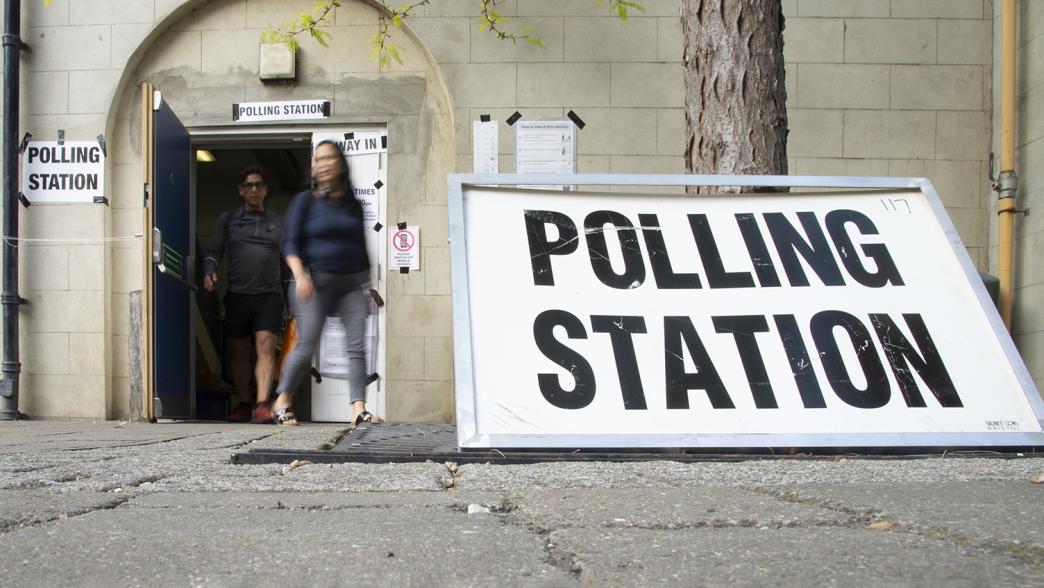
The prime minister can call the next general election any time between now and 17 December 2024 – which is exactly five years since parliament first met after the last general election, in 2019. If an election has not been called by this point, parliament would be automatically dissolved and the election would take place 25 working days later. This means the latest date for the next general election is 28 January 2025.
To call an election before 17 December 2024, the prime minister must ask the monarch to dissolve parliament. In recent decades this has usually been done in a visit to Buckingham Palace, with the prime minister announcing the general election from the steps of Downing Street shortly after. Parliament is then typically dissolved a few days after the announcement to allow unfinished parliamentary business to be completed, known as ‘wash-up’. The ‘pre-election period’ (previously known as ‘purdah’) normally begins once the election is called, or shortly after, and places restrictions on government activity during the campaign. 21 House of Commons Library, (2023, March 10). Pre-election period of sensitivity, researchbriefings.files.parliament.uk/documents/SN05262/SN05262.pdf
The prime minister no longer needs parliament to vote for a general election, which was required between 2011 and 2022, after the Fixed-term Parliaments Act 2011 was repealed and replaced by the Dissolution and Calling of Parliament’s Act in 2022.
How will the prime minister decide when to call an election?
Prime ministers have called elections for various reasons in the past: to secure a mandate on a specific issue, to strengthen their authority in parliament, or because the five-year term has ended. In the past 40 years, governments have only tended to call an election before the end of the five-year term when confident of success. The party in power has won a majority on five of these six occasions (the exception being 2017).
The key factor most likely to determine when Rishi Sunak calls the next election is when he has the maximum chance of success. There are two overarching calculations he will make in judging this:
The strength of his political position
The Conservatives are trailing Labour in the polls, and the prime minister will want to narrow that gap before calling an election. In aiming to do so, he will consider:
- The economy: When the economy is doing badly, or has recently suffered a shock, incumbent governments tend to do worse in elections. 22 Fisher, S. (2023, April 7). Why majoritarian governments win and lose: UK elections since 1922. www.doi.org/10.31235/osf.io/beh78 Sunak made the economy a focus of three of his five pledges. He met his target to halve inflation in October 2023, and inflation fell further to 3.4% in February 2024. GDP growth was negative in the final two quarters of 2023, 23 ONS, GDP first quarterly estimate, UK: October to December 2023, 15 February 2024, www.ons.gov.uk/economy/grossdomesticproductgdp/bulletins/gdpfirstquarterlyestimateuk/octobertodecember2023 and is forecast to flatline in 2024. 24 Bank of England, Monetary Policy Report, November 2023. Available at: www.bankofengland.co.uk/monetary-policy-report/2023/november-2023
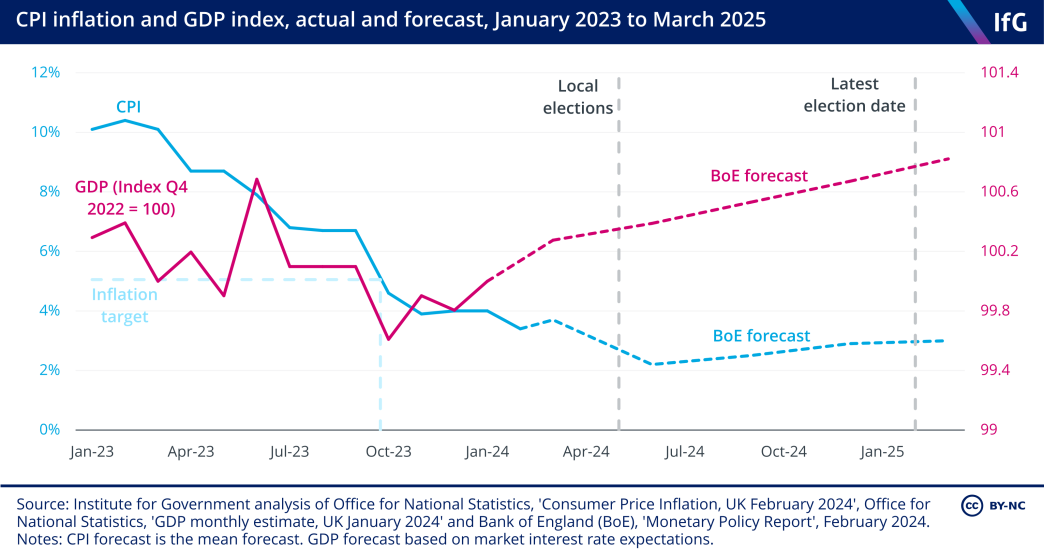
- Delivery of other key pledges: Sunak also promised to cut NHS waiting lists and pass legislation to stop small boats. The high-profile elective waiting list has recently fallen, but remains more than 300,000 than when he made his pledges and industrial action by doctors continues, slowing progress on reducing it further. Previous projections have suggested the elective waiting list may not see a sustained fall until June 2024. 27 Warner, M and Zaranko, B. (2023). One year on from the backlog recovery plan: what next for NHS waiting lists?. London: Institute for Fiscal Studies. Available at: www.ifs.org.uk/publications/one-year-backlog-recovery-plan-what-next-nhs-waiting-lists
On small boats, although the government did pass legislation, as Sunak pledged to do, the government’s Rwanda plan was rejected by the Supreme Court and small boats crossings remain high. 28 Home Office, Irregular migration to the UK, year ending June 2023, 24 August 2023. Available at: www.gov.uk/government/statistical-data-sets/irregular-migration-detailed-dataset-and-summary-tables If the seasonal pattern of small boat crossings from 2021-23 were to continue, arrivals would reach their peak in late summer and be at their lowest over winter.
Sunak will want to make progress on those pledges, or pivot away from them.
- The broader political context: Beyond the five priorities, there are many potential events and issues that could affect Sunak’s poll ratings. Some may be hard to anticipate, such as an unexpected war or natural disaster. Others are widely expected in the months ahead, including the first of the Covid-19 Inquiry’s interim reports.
- Labour’s performance: The opposition might begin to lose support because of its own decisions or behaviour, helping to rebalance the polls in Sunak’s favour. In 2017, Theresa May decided to call an election in part due to Labour’s poor poll ratings. Sunak may do the same if it looks like support for Labour is waning.
- Pressure from the party and Conservative MPs: MPs and advisers in the Conservative party might put increasing pressure on the prime minister to hold an election on a date they see as the most advantageous. Similarly, the PM might set an election to avoid party discipline breaking down and end disruptive speculation about both the date of the election or his own position.
When he thinks the Conservative party is ready to run the campaign
Election campaigns take time to plan and run. The Conservative party must select candidates, including to replace the more than 60 sitting Conservative MPs standing down, and be ready to operate a campaign across the country and around each candidate. This requires funding, alongside a compelling political vision and manifesto to take to voters. Labour will also be preparing its campaign, and Sunak will want his party to be in as strong a position as possible relative to his opponents.
What are the potential times for the general election?
There are broadly three scenarios for when the prime minister will hold an election:
- A summer 2024 election.
- A late election: held at the last possible moment, in January 2025.
- An autumn 2024 election: giving the prime minister more time to narrow the gap in the polls, but not waiting the full course.
On 4 January 2024, Sunak indicated that his “working assumption is we'll have a general election in the second half of this year”, making an autumn 2024 election seem most likely. 31 Geiger C, ‘Rishi Sunak suggests general election in second half of year’, BBC News, 4 January 2024, www.bbc.co.uk/news/uk-politics-67883242
The general election is likely to be held on a Thursday, since Sunak is unlikely to break the convention for a Thursday polling day, which dates back to 1931.
A summer 2024 election
Ten of the last 11 general elections have taken place in spring or early summer, and six of these were held jointly with local elections, which reduces the costs of holding separate elections. 2 May 2024, the date of local and mayoral elections in many parts of the country, was previously a likely general election date in this period – however Sunak has since ruled this date out. 32 Whannel K, ‘Rishi Sunak rules out general election on 2 May, BBC News, 15 March 2024, www.bbc.co.uk/news/uk-politics-68568448
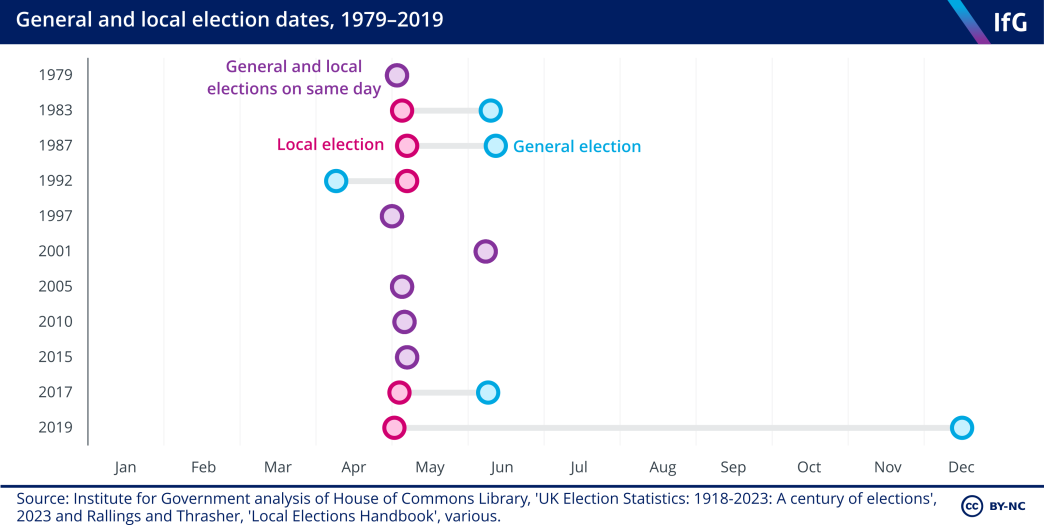
Sunak can call the general election at any point, including before the local elections. If an election was called in the days immediately following the local results, the earliest general election dates would be either 13 or 20 June. The former, however, would require parliament to be dissolved on 8 May, leaving very little time following the local elections for ‘wash-up’ of remaining parliamentary business.
Sunak could hold a general election in July or August, however this would be highly unusual: there has not been a general election in August since 1895, and the only July contest since then was immediately after the second world war. The timing of school holidays, and concerns about their effect on turnout, may be a key consideration: term ends in late June for many schools in Scotland and Northern Ireland, and late July in England and Wales.
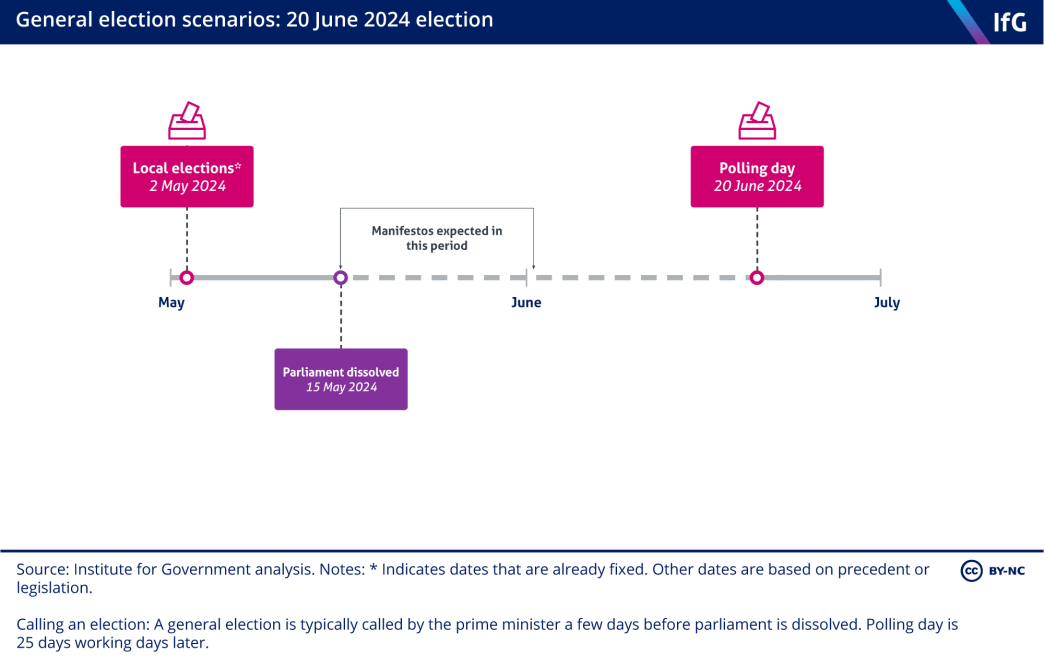
A late election: January 2025
The latest a general election can take place is Tuesday 28 January. Sunak is likely to follow the convention of holding elections on a Thursday, making 23 January the most likely latest election date.
The principal benefit of a late election is, simply, time. A January 2025 election would give the government the maximum amount of time to deliver on its priorities and prepare a campaign, and leaves the longest possible gap between the recent period of very high inflation and polling day. There would be more time to cut NHS waiting lists, particularly if industrial action by doctors can be resolved. Small boat crossings, another of Sunak’s five priorities, tend to be lower over winter – even if that is due more to weather than government policy.
But a January election would require the campaigning period to run over Christmas – something that has not happened in the UK since 1910 and is likely to be unpopular with the public. Poorer weather and shorter daylight hours may also affect both campaigning and turnout. How these factors might impact the result is unclear, but a January poll would certainly make the organisation of the election, from manifesto launches and hustings to postal voting, more difficult.
A January election would also leave no time for a full, multi-year spending review process before the start of the next financial year in April 2025. A post-election government would have little choice but to roll over existing spending plans with only minor changes, before conducting a more in-depth spending review later in the year to set out how it will use public spending to deliver on its priorities.
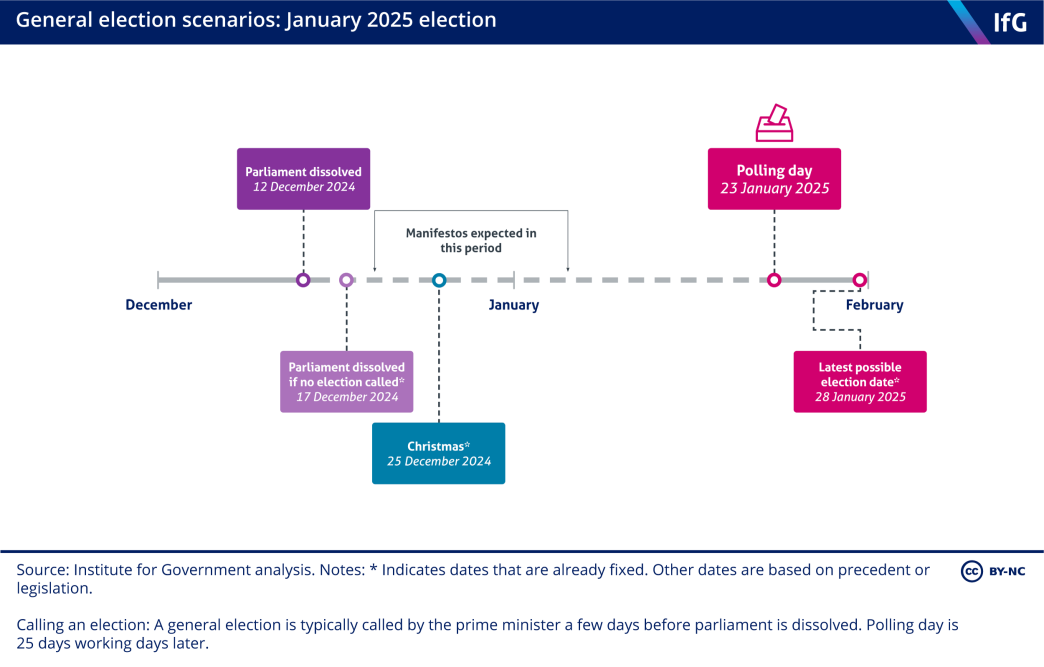
An autumn 2024 election
An autumn election would allow the prime minister more time to improve his prospects of success, but without risking the disruption of a campaign over the Christmas period. He also has some choice over when exactly to call an election in the autumn.
A key question would be whether to hold the annual party conferences. Conferences generate revenue for political parties and are an opportunity to launch policy positions. They may however be seen as taking energy away from preparations for the election – not least given most ministers would be expected to attend conference, taking time away from campaigning in the hardest fought local areas.
There are two main scenarios for an autumn election:
- Sunak could call an election on return from summer recess in early September, which would result in polling day in October. For example, an election called on the first day after summer recess, 2 September, with parliament dissolved on 5 September, would result in the earliest likely autumn election date of 10 October. The government would have to decide whether to cancel party conferences, usually held during this period, and absorb the loss of revenue, or use its event to launch policy in the weeks before an election. However, doing so could harm the election campaigns by drawing party members and resources away from campaigning across the country.
- Sunak could instead call the election during, or shortly after, the party conferences. Parliament typically returns from conference recess in the second week of October, and an election called that week would result in a polling day of 21 November. The latest likely election date before Christmas is 12 December. This would however mean dissolving parliament on 6 November, the day after the US election.
An autumn 2024 election would present whoever wins with similar potential spending challenges to the later election, with little time to run a spending review or to set departmental budgets for 2025 – though it would provide some time to change departmental budgets in key areas and potentially to finalise local authority budgets in December.
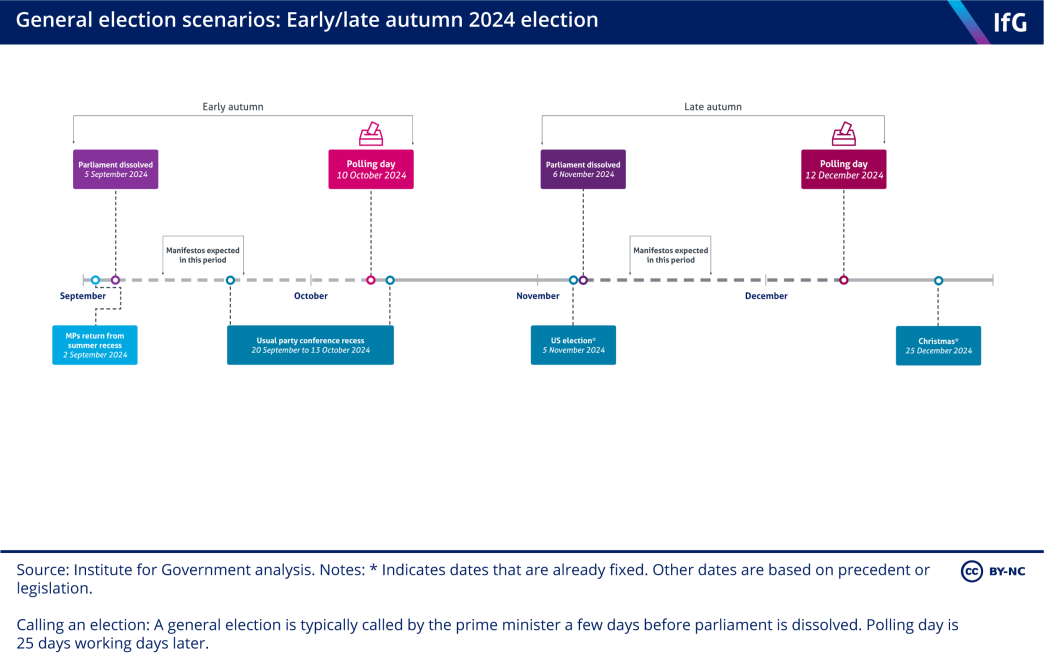
- Political party
- Conservative Labour
- Position
- Prime minister Leader of the opposition
- Administration
- Sunak government
- Department
- Number 10
- Legislature
- House of Commons
- Project
- General election
- Public figures
- Rishi Sunak
- Publisher
- Institute for Government